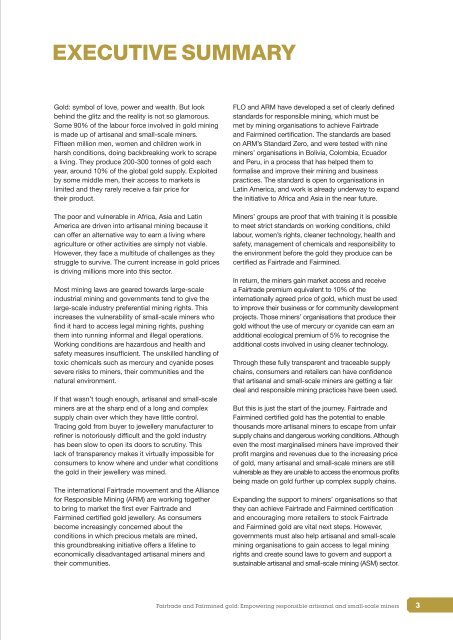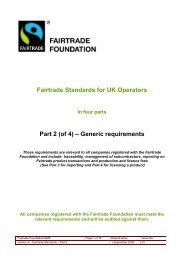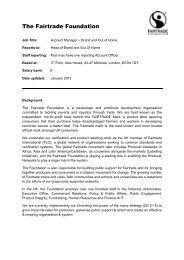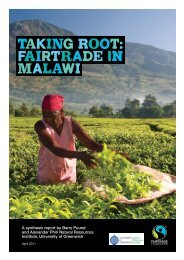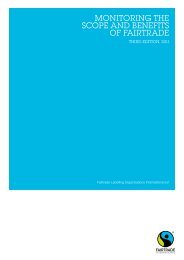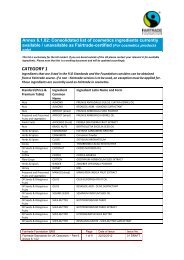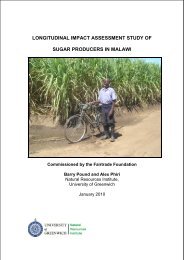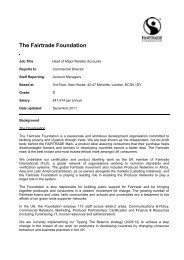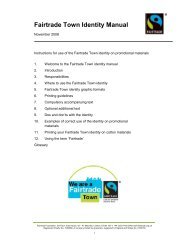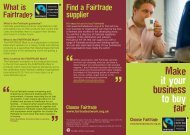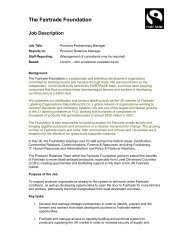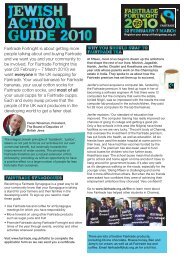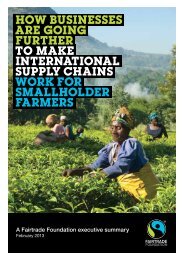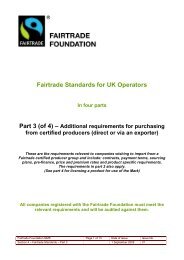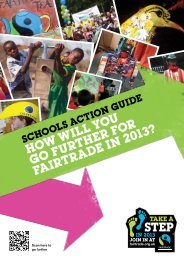FAIRTRADE AND FAIRMINED GOLD - The Fairtrade Foundation
FAIRTRADE AND FAIRMINED GOLD - The Fairtrade Foundation
FAIRTRADE AND FAIRMINED GOLD - The Fairtrade Foundation
Create successful ePaper yourself
Turn your PDF publications into a flip-book with our unique Google optimized e-Paper software.
EXECUTIVE SUMMARY<br />
Gold: symbol of love, power and wealth. But look<br />
behind the glitz and the reality is not so glamorous.<br />
Some 90% of the labour force involved in gold mining<br />
is made up of artisanal and small-scale miners.<br />
Fifteen million men, women and children work in<br />
harsh conditions, doing backbreaking work to scrape<br />
a living. <strong>The</strong>y produce 200-300 tonnes of gold each<br />
year, around 10% of the global gold supply. Exploited<br />
by some middle men, their access to markets is<br />
limited and they rarely receive a fair price for<br />
their product.<br />
<strong>The</strong> poor and vulnerable in Africa, Asia and Latin<br />
America are driven into artisanal mining because it<br />
can offer an alternative way to earn a living where<br />
agriculture or other activities are simply not viable.<br />
However, they face a multitude of challenges as they<br />
struggle to survive. <strong>The</strong> current increase in gold prices<br />
is driving millions more into this sector.<br />
Most mining laws are geared towards large-scale<br />
industrial mining and governments tend to give the<br />
large-scale industry preferential mining rights. This<br />
increases the vulnerability of small-scale miners who<br />
find it hard to access legal mining rights, pushing<br />
them into running informal and illegal operations.<br />
Working conditions are hazardous and health and<br />
safety measures insufficient. <strong>The</strong> unskilled handling of<br />
toxic chemicals such as mercury and cyanide poses<br />
severe risks to miners, their communities and the<br />
natural environment.<br />
If that wasn’t tough enough, artisanal and small-scale<br />
miners are at the sharp end of a long and complex<br />
supply chain over which they have little control.<br />
Tracing gold from buyer to jewellery manufacturer to<br />
refiner is notoriously difficult and the gold industry<br />
has been slow to open its doors to scrutiny. This<br />
lack of transparency makes it virtually impossible for<br />
consumers to know where and under what conditions<br />
the gold in their jewellery was mined.<br />
<strong>The</strong> international <strong>Fairtrade</strong> movement and the Alliance<br />
for Responsible Mining (ARM) are working together<br />
to bring to market the first ever <strong>Fairtrade</strong> and<br />
Fairmined certified gold jewellery. As consumers<br />
become increasingly concerned about the<br />
conditions in which precious metals are mined,<br />
this groundbreaking initiative offers a lifeline to<br />
economically disadvantaged artisanal miners and<br />
their communities.<br />
FLO and ARM have developed a set of clearly defined<br />
standards for responsible mining, which must be<br />
met by mining organisations to achieve <strong>Fairtrade</strong><br />
and Fairmined certification. <strong>The</strong> standards are based<br />
on ARM’s Standard Zero, and were tested with nine<br />
miners’ organisations in Bolivia, Colombia, Ecuador<br />
and Peru, in a process that has helped them to<br />
formalise and improve their mining and business<br />
practices. <strong>The</strong> standard is open to organisations in<br />
Latin America, and work is already underway to expand<br />
the initiative to Africa and Asia in the near future.<br />
Miners’ groups are proof that with training it is possible<br />
to meet strict standards on working conditions, child<br />
labour, women’s rights, cleaner technology, health and<br />
safety, management of chemicals and responsibility to<br />
the environment before the gold they produce can be<br />
certified as <strong>Fairtrade</strong> and Fairmined.<br />
In return, the miners gain market access and receive<br />
a <strong>Fairtrade</strong> premium equivalent to 10% of the<br />
internationally agreed price of gold, which must be used<br />
to improve their business or for community development<br />
projects. Those miners’ organisations that produce their<br />
gold without the use of mercury or cyanide can earn an<br />
additional ecological premium of 5% to recognise the<br />
additional costs involved in using cleaner technology.<br />
Through these fully transparent and traceable supply<br />
chains, consumers and retailers can have confidence<br />
that artisanal and small-scale miners are getting a fair<br />
deal and responsible mining practices have been used.<br />
But this is just the start of the journey. <strong>Fairtrade</strong> and<br />
Fairmined certified gold has the potential to enable<br />
thousands more artisanal miners to escape from unfair<br />
supply chains and dangerous working conditions. Although<br />
even the most marginalised miners have improved their<br />
profit margins and revenues due to the increasing price<br />
of gold, many artisanal and small-scale miners are still<br />
vulnerable as they are unable to access the enormous profits<br />
being made on gold further up complex supply chains.<br />
Expanding the support to miners’ organisations so that<br />
they can achieve <strong>Fairtrade</strong> and Fairmined certification<br />
and encouraging more retailers to stock <strong>Fairtrade</strong><br />
and Fairmined gold are vital next steps. However,<br />
governments must also help artisanal and small-scale<br />
mining organisations to gain access to legal mining<br />
rights and create sound laws to govern and support a<br />
sustainable artisanal and small-scale mining (ASM) sector.<br />
<strong>Fairtrade</strong> and Fairmined gold: Empowering responsible artisanal and small-scale miners 3


